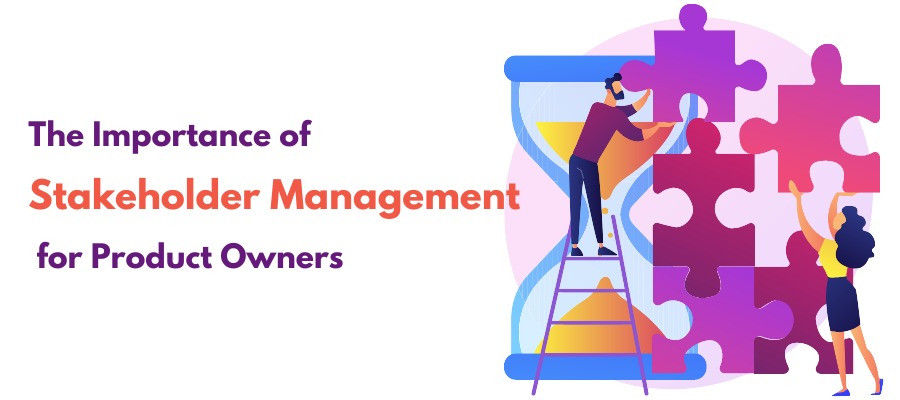The Importance of Stakeholder Management for Product Owners

Within a company, being a Product Owner is one of the most significant jobs. As the Product Owner, it is your responsibility to manage the creation and distribution of goods and services, as well as their execution, to guarantee that they satisfy the target audience's requirements. This indicates that you need to handle stakeholders efficiently to guarantee the success of your product. Identifying and interacting with individuals interested in a product or service to ensure that those individuals' requirements are satisfied is called "stakeholder management." Product Owners must have a solid understanding of the significance of stakeholder management and the best practices for managing stakeholders.
Importance
Product Owners should prioritize stakeholder management because it improves the likelihood that their products will be created with end users in mind. Product Owners may learn more about their customers' desires and requirements when they consult with those with a stake in the product's success. They may then design goods and services that specifically address the requirements of their target market. Another benefit of stakeholder management is that it alerts product owners to any problems or threats that may surface during development so they may take preventative measures.
Product Owners can benefit from maintaining and fostering connections with stakeholders by actively engaging with them. Product Owners should keep stakeholders in the loop about new information or changes. Getting everyone invested in and excited about the product is important since that will ultimately fuel its success.
Managing Stakeholders
Product Owners need to make sure that they have a crystal clear awareness of who their stakeholders are and the interests that each of their stakeholders cares about before they can effectively manage them. Research methods, such as interviewing consumers and other stakeholders to better understand their requirements and preferences, are one way to accomplish this goal. Here are some tips for managing stakeholders:
1. Say 'no' to stakeholders
Learning to confidently decline stakeholder requests is essential for every Product Owner. Requests from customers come in all shapes and sizes and can be challenging to accommodate. Remember, though, that your job is to provide a service or good that the customer will find helpful and enjoyable. Being able to respectfully decline requests helps teams stay focused on their primary goals of providing value to customers and communicating successfully with one another. It's important to set limits and know when to say "no" to ensure the appropriate choices are made and that the final result lives up to expectations.
2. Do not continue to treat all stakeholders equally
Recognizing that each stakeholder has unique interests, functions, and levels of influence in the project is preferable to treating them all the same. Product Owners should prioritize stakeholders by devoting more time and energy to those with the most influence or invested in the project. Spending more time and energy ensuring their requirements are satisfied or giving them more help generally can help guarantee their success. By prioritizing the input of the most influential stakeholders, you may improve the project's overall efficiency and effectiveness. In addition, it's a great opportunity to let them know how much you value and appreciate what they've done. Product Owners may make sure that everyone's needs are met and that the project is a success by taking the time to carefully analyze and rank the many parties with a stake in the outcome.
3. Act like an owner
If you want to make the most of your mandate and take control of the product, you must act like the owner. It is important to embrace a mindset of ownership and responsibility. Coaching Product Owners is more than just technical advice - it requires helping them to develop a vision and build confidence in their decisions. While there is no definitive way to act, it is essential to never let indecisiveness stand in the way of progress. Being an owner means having the courage to make decisions, even if they are not perfect. This is the key to success.
4. Involve Scrum Master Or Agile Coach
Involving your Scrum Master OR Agile Coach in stakeholder management is essential to achieving success. Not only do you own the product, but the Scrum Master OR Agile Coach owns the process. They are your go-to person when understanding how to meet stakeholders' expectations. They can provide the tools and techniques to manage stakeholders most efficiently and effectively. They will ensure that all stakeholders are informed, and their expectations are met. With their expertise and experience, they will help you navigate the complexities of stakeholder management and ensure that the project is a success.
Conclusion
Product owners must take the time to understand the importance of stakeholder management and the best practices for managing stakeholders. It is essential to identify stakeholders and prioritize them based on their influence and level of investment in the project, as well as to act like an owner and involve your Scrum Master OR Agile Coach. Stakeholder management is an important part of the product owner's role and should not be taken lightly. By following these tips, product owners can ensure that their products will be created with the customer in mind and that their efforts will lead to the product's success.
References
- https://www.romanpichler.com/blog/stakeholder-management-tips-for-product-people/#:~:text=Articles%20from%20Roman-,Getting%20Stakeholder%20Engagement%20Right,be%20difficult%20to%20achieve%20success.
- https://ancaonuta.medium.com/6-tips-for-the-product-owners-on-how-to-manage-stakeholders-fefec4908c9d



